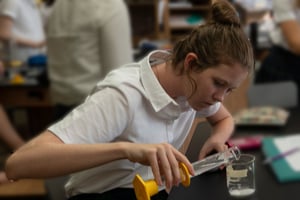It is easy to experience disequilibrium at Cambridge.
The first event during my recent visit to the University of Cambridge was dinner. When I sat down, I struck up a conversation with the affable man seated opposite me. We chatted a bit about trivial matters. I assumed that he was an attendee, I inquired, “So what do you do?” He answered, “I am professor of Nuclear Science and Engineering at MIT. I am working on fusion energy.” I asked, “So what do you do?” He smiled, “I heat plasma to 50 million degrees, many times hotter than the center of the Sun, to see if we can harvest more energy than we spend when binding atoms in nuclear fusion.”
Dr. Ian Hutchinson was a speaker at the conference (not an attendee) and my pleasant (albeit intimidating) interaction with him was a sign of things to come during my week at the Faraday Institute.

I was privileged to attend a weeklong seminar on Science and Religion provided by the Faraday Institute at St. Edmund’s College at Cambridge University. The purpose of the seminar was to help Christians involved in teaching theology and science, and leading Christian institutions to understand contemporary scientific issues including origins (cosmology and creation/evolution), environmental, and biomedical. The trip was sponsored by generous parents of our school who wanted to help us keep up with cutting-edge scientific research and thinking.
 Digesting Views That Oppose Our Own
Digesting Views That Oppose Our Own
My experience at Cambridge taught me many things, but more than anything it again proved the value of listening. In this world where staunch advocates of one viewpoint - be it political, religious, or social on either end of the spectrum - are constantly baring their teeth shouting down at those on the opposing end, we need more good listeners.
I come from a Bible-believing and conservative background, and on that foundation I still stand. The Christian school I lead believes that Adam and Eve were two historical persons. The Faraday Institute is made up of believers that often come from a different point of view. Most would affirm that God used the process of evolution to bring about all the diversity that we see in the world today (a school of thought commonly called “theistic evolution”). Some would claim that I am reading parts of the Bible in a more restrictive manner than I should.
My views did not change during the week, but I was blessed by being able to listen carefully, ensure that I am seeing the current issues clearly, and experiencing that humbling disequilibrium of seeing God’s glory in creation. I came into contact with ideas that are both challenging to some parts of my faith and that will help me prepare students to love, serve, and think as they grow to be men and women who will lead families, churches, and prepare for collegiate studies.
(Disequilibrium is one of my favorite words, and I am using it to mean something like the feeling that you get when you ride a big roller coaster for the first time—the feeling of being both overwhelmed and knocked off kilter. It is usually the feeling that precedes growing mentally, intellectually, spiritually, and emotionally—and even growing to like roller coasters. It is painful and disorienting at first but leads to greater confidence and usefulness in the long run.)
Veritas, and its classical Christian sister schools across the country, love thinking and discussing (we try to train students to think critically and logically). We have a history of trying to listen to the best advocates of ideas—even when the issues are incendiary.
For example, a few years ago, we asked Gil Smart (then a local columnist for LNP) to come and make an argument in favor of gay marriage. Our students got a chance to question Gil after his presentation and had to write Mr. Smart responses to his argument. He graciously answered the best of their responses in his column (we miss Gil, by the way). We have had advocates of many different worldviews and religious traditions come and speak to our students. We expect our students to listen and to answer respectfully.
Sadly, Christians often don’t do a great job listening, and because of this, we tend to miss the great blessing of developing what I have started calling “Antifragile Faith.” I am on a quest for this sort of faith—faith that looks at the world as it really is rather than how we would like to imagine it—and clings to Christ while being challenged to grow.
It is clear from recent data that Christian parents in Lancaster County - and Christians in general - should be interested in Antifragile Faith for their children. The Barna Group has found that a large percentage of the children of evangelicals walk away from their faith in college. Some of the top reasons cited by these young adults are that churches and parents are overprotective and that they don’t know how to navigate issues concerning science and religion. Our children’s faith is so fragile that it can’t withstand life or college. Christian schools and Christian parents should take note.
So, I’d like to give you a few vignettes of my experience at Cambridge as examples of challenges that caused disequilibrium so that you can get a feel for them. Along with these stories, I will make a few points about the value of listening to things that knock your assumptions around.
The Physics of the Universe and Its Origins
One of my favorite talks was on physics and cosmology given by Dr. Paul Shellard, the Director of the Centre for Theoretical Cosmology at Cambridge (if there is a more impressive title in academia I have not encountered it). He is also the Project Leader for the European Space Agency’s Planck Satellite. The Planck Satellite is sitting out in space spinning. As it spins, it records the findings it sees from cosmic microwave background radiation.
Using a principle similar to Doppler, the Planck Satellite “sees” everything rushing away from us. Dr. Shellard put a map of the Universe made by the Planck Satellite on the screen, and it was amazing. To Planck, the Universe looks like a symmetrical sort of smashed egg. Scientists like Dr. Shellard have calculated back from where things appear to be now to where everything they see converges. They calculate about 13.7 billion years.
 Here is a point of disequilibrium for me. My mental picture of the world is a little younger! So, why listen to this talk?
Here is a point of disequilibrium for me. My mental picture of the world is a little younger! So, why listen to this talk?
In many ways, these findings can feed, not destroy, our faith. After all, Planck is proving that the Universe did, indeed, have a beginning - something that unbelieving physicists like Stephen Hawking (a close friend of Dr. Shellard) have spurned. These findings are driving unbelieving physicists to apoplexy (aggravated disequilibrium!).
The talk also enhanced my appreciation for the fine tuning of the laws of physics that make life possible. Shellard pointed out that if the attractive force between atoms was just a tiny bit stronger, life could not exist. He and others have calculated that these fine-tuned laws had to be in place 10-43 seconds after the beginning of the Universe. The fine-tuning of the laws of physics and understanding the ongoing discussion and debates helped me see ways in which people like Dr. Shellard are doing work that is asking incredible questions.
Evolution
The other, and by far, most controversial issue was the ongoing Creation/Evolution discussion. Again, I went in affirming the historicity of Adam and the truthfulness of the Genesis account and I left at the same place. Still, I have profited from reading and interacting with people whose views were different than mine, including Professor Keith Fox, a professor of Biochemistry from Southampton University.
As someone who has been in the thick of this discussion since high school, I was caught off guard by how dated my knowledge was. The sequencing of the genome and the study of comparative genetics has drastically affected the conversation. For many in the camp of theistic evolution, they feel that this genetic evidence is something that substantially bolsters and affirms their claims.
 Another talk by Professor John Walton from Wheaton College discussed how, too often, conservative Christian readings of Genesis 1-3 import many of our modern assumptions and even topics from modern debates about origins into the text. He argued that what we need to do is to understand the text within the context of the Ancient Near Eastern people to whom it was given. Once we do this, he believes that some of the difficulties between modern science and biblical faith can be resolved.
Another talk by Professor John Walton from Wheaton College discussed how, too often, conservative Christian readings of Genesis 1-3 import many of our modern assumptions and even topics from modern debates about origins into the text. He argued that what we need to do is to understand the text within the context of the Ancient Near Eastern people to whom it was given. Once we do this, he believes that some of the difficulties between modern science and biblical faith can be resolved.
Again, these talks were coming from perspectives with which I had some serious disagreements, but I found them to be immensely helpful in the following ways:
- Thinking through the process of natural selection (by this I mean the genetic adaptability God has built into the genome allowing species to adapt to environmental change) gave me an even deeper appreciation for God’s wisdom.
- While I disagreed with some of the things John Walton said, I learned a lot from his take on the early chapters of Genesis. He helped me see how some of the questions we are asking of the text might not be ones that the text is answering for the original reader. I value those sorts of insights greatly.
- Learning these perspectives can keep me from saying dumb things when I am trying to think through these issues or talk with others about them.
Finally, listening to people talk about these issues showed me that there are still some crucial questions that need to be answered before I can be comfortable with theistic evolution. So far, I have read no adequate explanation how this teaching can be consistent with the Christian understanding of how mankind fell into sin and why each of us is born sinners. Without an explanation of why the world and each of us is so broken, we are left without a clear vision of who we are and how much we need Jesus to save us.
Science and Scripture
The Faraday Institute deserves praise for their intentions and the speakers they brought to the event. They set up a conference that was both shamelessly informative (almost wonkish at points) and yet digestible for the interested layman (like me). Most of the speakers spent time listening to the other lectures, sharing meals with the attendees, and asking questions of people in other fields. I had the privilege of meeting people like Dr. John Wyatt who courageously developed the protocols for treating newborns who are not breathing. His work has saved many lives.
My time at Cambridge did highlight this, however: Christians are still doing a fairly poor job of listening to each other. This is true on both sides of the science and religion issues.
Conservatives (like me) need to listen to scientists because we need to prepare our children and students for the world (not the world in our mind). Also, however, Christian scientists need to listen to conservative Christians who are asking theological questions that believers in science need to be wrestling with—questions which might help them avoid diluting or uprooting their own faith or the faith of others.
In the end, we should aim at a faith that affirms that God wrote two books: the book of Scripture and the book of science. Christians (like me) believe that were we to understand both of these works completely and rightly, then they would not disagree. Today, we see through a glass dimly. We pray for more light and the patience and courage to see the world, our Bibles, and each other by it.







